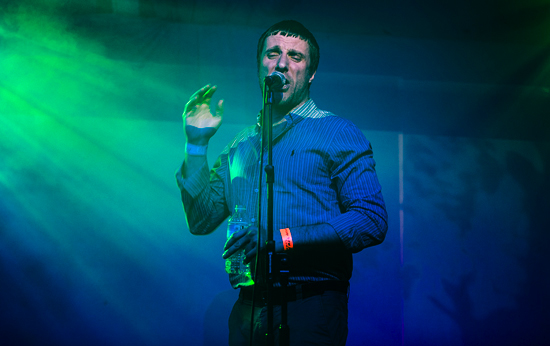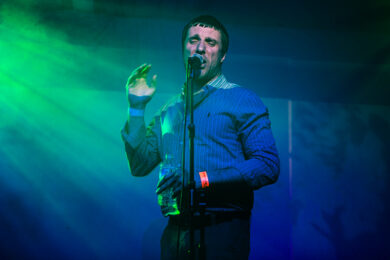This is a time for shouting
It’s fantastic to see Sleaford Mods headlining a festival like Supersonic – your more mainstream events are hardly likely to take a punt, and it’s a credit to the organisers that they’re given such prime billing here. Lord knows we need their ilk right now. What’s remarkable is the level of finesse to the duo’s live performance, which is odd as there’s superficially very little going on onstage. Andrew Fearn presses play then bobs around in his Night Of The Living Dead t-shirt, drinking a can of lager, grinning and mouthing along, looking as pleased as punch. The obvious thing would have been to give him a mic for back up shouts, but of course they don’t do that, because Sleaford Mods don’t really ever do anything obvious. They deal in the unexpected, in wit and aggression and being proudly who they are, just like all those artists they’re frequently compared to. It’s only live that you spot Jason Williamson’s tattoo of the old British Rail logo, an uncanny connection to those Earl Brutus references.
Sleaford Mods live are also unexpectedly and incredibly camp, Williamson standing hand on hip and bottle of water in his left hand, walking in tight circles round the stage, chest out. He seems to have a physical tic, flicking the back of his neck or the top of his head, or putting his palm against the nose. Perhaps it’s a memory device – the man’s power of recall is incredible, especially given the level of performance, the care in the delivery, the mocking voices for characters in the songs, or the introductions – "This one’s about rich people. I’m rich now. Whip whip" before ‘The Corgi’.
Fearn and Williamson themselves are utterly inscrutable – you can never tell whether they’re enjoying themselves or think it’s preposterous they’re headlining the first night of an arts festival full of softies. Which is sort of the problem that Sleaford Mods – and by extension the rest of us – face. You think about how The Fall would go and play working men’s clubs, Polytechnics and any old pub because that’s where you got a few quid in places like Barking, Huddersfield, Oldham. These days, the likes of Sleaford Mods are going to be limited to certain crowds in the major cities alone. There ought to be some arts grant where Sleaford Mods play at All Bar Ones, village fetes, steroid gyms, literary festivals, Bluewater mall car raffles. There isn’t, which is why we’re fucked. Leaving Digbeth and walking up to our Travelodge, signs everywhere suddenly start barking out like Sleaford Mods’ lyrics, Williamson’s voice still ringing in the ears: "Road traffic incidents", "family matters", "No pass outs, No pass outs", "Shropshire growers". Long may he echo. Luke Turner
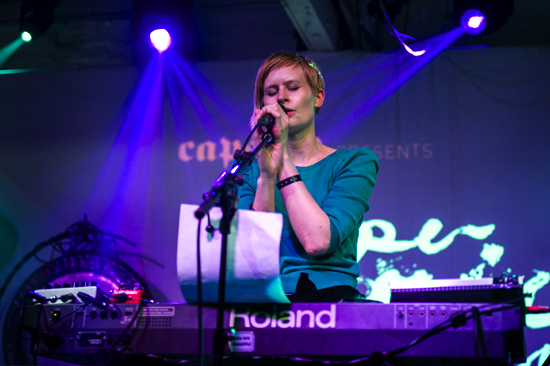
My cross-dressing days are behind me
"Today Bill Drummond launches his career as a cross dresser," reads the blurb for the man’s appearance at Supersonic. "Tremendous!", I gasp. You see, I’ve spent a portion of my life wishing I could be someone else. Not necessarily a woman but, you know, just someone different – like if I could trade my Catholic guilt for a Protestant work ethic, or swap my propensity for heroic cider drinking in return for a startling talent for light opera. And I could not think of single living person better to live vicariously through than Bill Drummond.
So, we get there and Bill embarks on this spiel about the time he caused an earthquake in Haiti, and soon we’re all standing outside in the industrial purlieus of Birmingham, re-enacting the events which, according to Drummond, were the cause of this supposed natural disaster. But the West Midlands are comparatively unfazed by our nefarious efforts to wreak tectonic havoc, and soon we’re back inside, and Bill begins to talk about cross-dressing. Finally! And he gets up and says "I’m not going to cross dress with a woman… there’s a journalist here," and I’m thinking "Oh shit, I don’t think I’m wearing any underwear". But Bill continues "… a journalist who writes for the Quietus…" and I’m beginning to seriously sweat and panic, until John Doran, chief pastor of this fine parish, steps up to the plate and begins to undress, in tandem with Bill Drummond. And while John bemoans his journalist’s physique and Bill’s decision to wear a vest, I’m sat there looking at them change over, and realise they look exactly the same. John Doran looks like John Doran wearing Bill Drummond’s clothes, and Bill Drummond looks like Bill Drummond wearing John Doran’s clothes. And I think to myself, as I grapple with my guilt, my hangover and lack of sufficient underwear, that things aren’t all that bad. I’m probably grand just the way I am. Colm McAuliffe
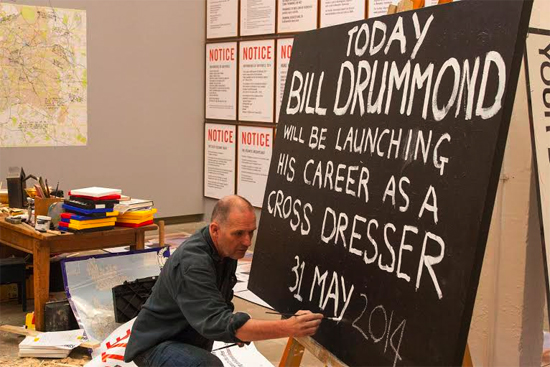
Everywhere you go, everything is vibrating
Who knows what kind of machines they used to have in the Custard Factory back in its former, industrial days, but one imagines even the most health and safety defying Victorian engineers couldn’t have come up with the volumes encountered this weekend. Sound levels are a problem at most UK festivals, but at Supersonic this is never an issue – with no real neighbours to worry about in Digbeth, the sound is cranked. And boooooooy is it cranked – when I arrive on site for the epic prog racket of Anta, my eardrums flap like unrolled johnnies in a wind tunnel, and there’s a constant rain of dust from the ceiling throughout the weekend.
Yet this volume is never at the expense of quality – in Matmos’ set on the Friday night the sound is pristine, so clear and dense you half feel you can see it flying around the room. For Ryan Jordan on Saturday evening it’s even more intense, effects and a strobe blasting regularly in time with nasty stabs of rhythm into a room that smells curiously of burning wood, getting faster and madder and faster again, like a metronome wanking itself into oblivion. This again is tactile noise, the crackle a forest fire amplified at close range.
Of course, it works for more subtle moments too. Before Swans’ finale, Jenny Hval’s vocals fly up and around while being entirely unshowy. Her left index finger vaguely traces the melody and rhythms, and for a moment you might wish she left the band (guitar and drums) at home, but her voice is such a powerful thing that it rises above them with ease. Plus there’s a lot more at play here: one track suggests Throbbing Gristle’s ‘Convincing People’ rendered singer-songwriter, at another moment Hval is playing whispered intimacies from a Walkman. It’s a personal and confessional conversation that’s at once shared by us all, which seems to get to the heart of what she does. Luke Turner
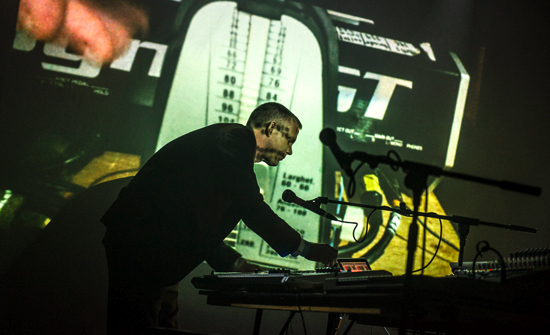
Karen Gwyer can collapse time with her organ drones
With the reverberations from Ryan Jordan’s experiments in audiovisual bludgeoning just about receded, Karen Gwyer is busy working up a dense techno texture in the second room. Density is the key here; the four-on-the-floor pulse feels like it’s pushing the room towards becoming a dancefloor, but the extra rhythmic matter ticking over on top stops it just short, similarly to some of the more heavily beat-laden tracks on her Needs Continuum album. This doesn’t last for long though, and Gwyer simmers things down to a droning organ loop that continues for the rest of the set, almost thirty minutes. Well, it could have been thirty minutes, but the effect of this second half is hypnotic, and time begins to fall in on itself. This is the side of Gwyer that produced the two sprawling tracks on this year’s New Roof EP, where repetition with constantly evolving, slight variations and an underlying sense of build takes precedence.
The organ line hovers between moments of beautiful melody and jarring discordancy, shifting around a central core but never quite static. The space feels transformed – with Jordan, it was a claustrophobic, strobe-filled science lab; now, cast in a dim red glow, the white-washed walls don’t seem so cramped, an ideal setting for wallowing in that glutinous synthetic loop. While the intent with which Gwyer stands over her tabletop of instruments suggests that the drone may give way and pull in another direction, brilliantly, it never does. Walking out into the courtyard afterwards feels like a welcome spinning out back into real time. Laurie Tuffrey
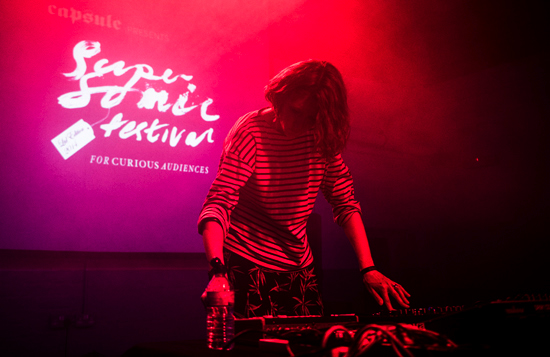
Sly & The Family Drone bring the egalitarian racket
It’s mid-play on Saturday, and the evening’s sunlight streams in through the glass ceiling to illuminate an bizarre scene: a sweat-soaked man stripped to his (very threadbare) boxers, grinning and flailing while perched atop an amp stack set up in the middle of the floor. Beneath him Sly & The Family Drone’s band members, indistinguishable from the sea of audience bodies pressing in and mingling around them, churn out a grotty rhythmic racket: an overdriven oscillator is all machine gun chatter, spitting arcs of gutter noise and great pungent showers of distortion out across the room. It’s brusque and simplistic, but also joyful – and even for a congregation whose minds are still bruised from the linguistic assault of Sleaford Mods the night before, it’s an invitation to involvement. At some point amid the bludgeoning, the band members start carrying percussive instruments out into the crowd, handing out drums, broken cymbals and sticks. The lines blur between performers and participants as the audience percussionists fall loosely into line, bolstering a core pulse that bangs like a headache.
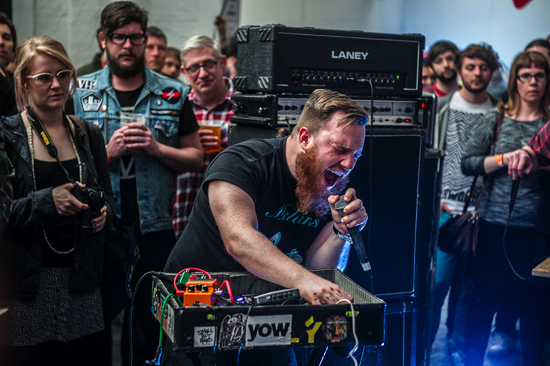
I look to my right and spot Quietus editor John Doran’s head a few metres away, peeking out from above the people surrounding him; he throws his fist up in the air in acknowledgement. The effect, for all the music’s blasted edges, is blissed-out rather than wired, surprisingly well-suited to daytime performance; I’m reminded of getting temporarily lost in the hypnotic pummel of Lightning Bolt at full-bore, or the body immersion of Consumer Electronics. At set’s end, someone passes a pint and half a pizza to the band member poised, three-quarter naked and precarious, atop the amp stack. The beer returns to its owner relatively unscathed; the pizza is less lucky, ending up vigorously lobbed into the scrum below, presumably to end up smeared across some unlucky sod’s back or face. A suitably messy ending to a scrappy, revelatory set that’s one of the weekend’s best.
Wolf Eyes are on strong live form at the moment – their gimlet-eyed, sickly set at Incubate last year was the festival’s highlight – yet it’s almost inevitable that they’d suffer following such a directly involving performance. The matter their music is made of is much the same: electronics that seethe and hiss, heaving rhythms and a stage manner that pairs malice with parody, complete with Nate Young characteristically dapper in shades and rock star sneer. But after Sly’s battering from within the audience’s midst, the onstage set-up feels strangely quarantined, the threat of impending violence that marks out the best Wolf Eyes sets neutered. All the moves are there, and they remain infectiously skillful at paying tribute to the rock and noise musics they’re inspired by while simultaneously poking fun at their inherently ridiculous aspects. Yet Wolf Eyes at peak volatility, in the right space, make you feel trapped and deliciously uncomfortable, unsure what’s going to happen next but equally afraid to leave. Tonight, distance maintained, we’re witnesses to the show, but never viscerally so. A high-velocity barrage of drums and noise leaks through from whoever’s playing next door, and we’re drawn elsewhere for a harder seeing-to. Rory Gibb
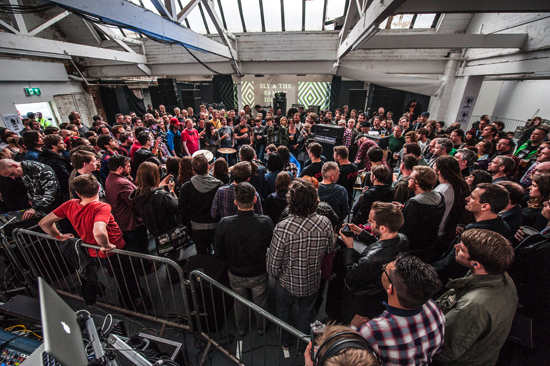
There’s a piece of the village in the heart of the city.
If you want nature in Digbeth you need to look pretty hard for it. The River Rea flows along in a deep and dismal culvert, and while there are wild flowers and blooming weeds growing out of old and derelict buildings, the general theme is of concrete, tarmac and brick. The If Wet collective, who organise experimental events in Village Halls, bring some of their rural and unusual experimenting to Supersonic via a salon on the Saturday afternoon. There are 3D printed woodpeckers that, in installation, are set up to peck roof beams and pillars of art galleries. We’re given a demonstration of these minor interventions in public space, before Sarah Kensington takes to the stage. She uses all sorts of abandoned and found objects (pram wheels, a bath with a reverb spring, washing machine, violin, pedal powered fret saw, typewriter, tuba, various drums and 500 wing nuts which act as switches as if in a sequencer) to make music (of sorts, it’s fairly wheezing and atonal) and is an absolute hoot explaining her gizmos and gadgets.
"I was in an African drumming band ten years ago and I was shit. I thought I needed to make a machine to do this, so I could do something more interesting. This spared me having to spend my life learning to play stuff". Her finest creation is a "drowning piglet" instrument, which features a hand pump, duck caller and an old fashioned watering can, and it all makes for a wonderful light interlude to the weekend, like Einsturzende Neubauten gone Mulligan and O’Hare. Luke Turner
Swans have a powerful effect on note-taking, and sometimes fried chicken is the only response
The first thing I find myself doing after Swans finish is hurtling up the road to the nearest chicken shop. Why the knee-jerk reaction to watching Swans is to procure some fried chicken, who knows, but none the less, there I go. Thank God I took notes, I think, as I put my order in. I bring up the notes on my phone and find a surprising trawl through the innards of my volume-blasted mind. Some are awed observations – "It’s a wrenching from mundanity", "Simple guitar chords should not do this". One simply reads, "Fuck it; forget it, go home" (I’m still not sure at whom this was directed – me? Swans?). And, strangest of all, "Cleave to sleep; it is the only relief". One is even accompanied by a small emoticon of a pagoda.
Looking back they might read as so much semi-gibberish, but at least they do provide some hints back towards what was going on at the time. The set is stalled early on by a power cut, which sets the scene nicely for the onslaught to follow only slightly less ably than a truly elemental disaster would (and even accidentally recreates a previous approach to performance the band’s leader favoured). Michael Gira darts back and forth across the stage, before Thor’s pounding drums emerge from the darkness and the show begins.
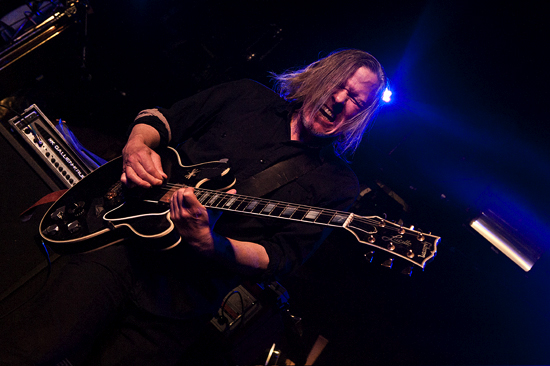
Maybe it’s the setting, with the band’s six members crowded onto a stage that’s only a little higher than floor level, but it seems to bring to the fore the flesh-and-bone nature of the music. Not that they’ve ever been less than daunting, but when housed in Koko in London, say, the band’s performance is more distant and ritualistic. Up close, you’re subjected to the sheer physicality of the band, and can watch the musicians hewing it out, diligently hammering at their instruments, paying strict adherence to Gira at all times.
He’s flanked by guitarist Norman Westberg and lap steel player Christoph Hahn, both of whom consolidate this workman-like feel, looking like they could as easily have been plying their trade whale-hunting in the salt spray off the coast of Cape Cod in the 1850s as grinding out the punishing crescendo of ‘Bring The Sun’. As the final sound waves dissipate, that’s what resonates most – the huge cathedrals of sound Swans summon up come from the same basic set of instruments as any other rock band, a formidable power indeed.
(Thanks, additionally, to Rooster Fried Chicken, for an excellent, sleep-cleave-aiding mega mix burger). Laurie Tuffrey
Supersonic is for curious audiences
Alright, that’s their marketing slogan, but festival organisers Capsule aren’t going to get sued by Trade Descriptions any time soon. A year off and a reduction in size of the site seems to have done wonders in giving Supersonic a shot in the arm – this year’s event had the excited feel of an entirely new event, not something that celebrated its tenth anniversary in 2012. Credit is due to the crowd, too; as Supersonic has stuck with its guns of challenging booking, so their audience has come with them, and during Wolf Eyes, whom one might consider a Supersonic staple, much of the audience notably drift instead towards Karen Gwyer in the second room. Supersonic 2014 was a revitalising and refreshing weekend of challenging – and incredibly good fun – music in excellent company, and a pleasing air freshener against the stench of nostalgia one all too often encounters elsewhere. Here’s to 2015. Luke Turner

